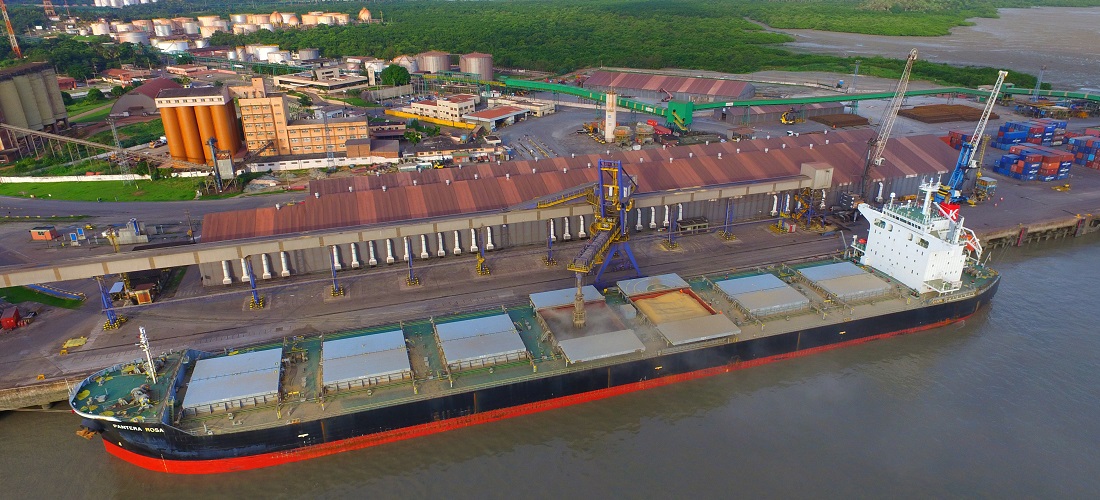
Brazil’s Tegram Terminal at Itaqui Port Moves 84 Million Tonnes in First Decade, Eyes Major Expansion
Apr, 08, 2025 Posted by Sylvia SchandertWeek 202515
The Maranhão Grain Terminal (Tegram), located at the Port of Itaqui, will celebrate its 10th anniversary in 2025. Over the past decade, it has moved 84.3 million tons of soybeans, corn, and soybean meal.
With a pioneering business model in Brazil, Tegram brings together four companies: Viterra, TCN, ALZ, and CLI. Each stage of the terminal’s operations is integrated with the broader Itaqui maritime complex.
“We work together because we understand that Tegram’s growth drives the development of the port and Maranhão. We always collaborate to explore possibilities for progress,” said Hibernon Marinho, the port’s operations director.
The Port’s Development and Zoning Plan (PDZ) outlines expansion strategies to benefit agribusiness and boost cargo handling efficiency and capacity. The private sector has also played a crucial role by introducing technologies and processes that enhance port operations and foster a more competitive, integrated business environment.
“We once dreamed of producing 10 million tons per year—and we’ve already reached 15.5 million. This partnership between the port and Tegram is undoubtedly productive and significant, not just for the company and the Port of Itaqui, but for all of Maranhão and the MATOPI region,” said Fabrício Salviato, CEO of Tegram.
Before Tegram was established, producers in the Itaqui region realized that the Northern Arc produced far more than it consumed. As a result, surplus cargo had to be trucked to ports in southern and southeastern Brazil, creating congestion and limiting output in the North.
“Tegram emerged as a logistical promise to open a new maritime shipping route. The market was cautious and unsure about the feasibility of this cargo. But once Tegram was in place and provided a reliable exit route, cargo began flowing immediately—boosting not just Maranhão’s economy but also that of its surrounding states: Tocantins, Mato Grosso, Bahia, and Pará,” said Marinho.
Although it began operations in 2015, discussions to establish Tegram started in 2012. Since then, the Port Authority (Emap) has remained actively involved, participating in public hearings and meetings with terminal-affiliated companies.
“Tegram was born from farmers’ need for a place to store grains. From there, we began issuing tenders, ultimately becoming what we are today. Of all the projects I’ve been involved with, Tegram is one of the ones I’m most proud of due to its significance, relevance, and innovation,” said Ellen Brissac, Contract, and Leasing Manager at the port, who took part in the project’s development from the beginning.
By offering a lower-cost logistical alternative to export grain, Tegram enables producers to deliver their goods to international markets at more competitive prices—key to expanding production. “We’ve been able to increase productivity and efficiency, which has reduced logistics costs and solidified Itaqui as a competitive port, ensuring the flow of grain exports,” added Marinho.
In just one year, Tegram moved 15.5 million tons of cargo—a fivefold increase from its first year of operations.
“Our first shipment was loaded in March 2015. That year, the terminal handled 3.3 million tons. In just one year, we increased our handling capacity fivefold,” Salviato said.
“Tegram currently employs around 400 people directly, not including the auxiliary businesses being developed alongside the terminal,” the CEO noted.
Tegram’s development has unfolded in key expansion phases. The first phase, completed in 2015, had an initial capacity of 5 million tons. In 2018, a second phase doubled that to 10 million tons. In 2025, a third growth phase is set to begin, aiming to raise grain shipments to around 24 million tons.
“Tegram’s importance to the Port of Itaqui is only set to grow, strengthening Maranhão’s strategic role in global agribusiness, especially since our ports supply markets in the U.S., as well as Europe and Asia, with strong competitiveness,” Salviato concluded.
Source: Portal Portuário
-
Shipping
Sep, 30, 2024
0
US East and Gulf Coast Ports Face Imminent Shutdown as Union Announces Intent to Strike
-
Shipping
Oct, 10, 2022
0
CMA CGM reorganises BRAZEX service
-
Coffee
Mar, 01, 2023
0
Coffee: Brazil’s February shipments at 1.309 million bags
-
Ports and Terminals
Sep, 23, 2024
0
Boxship dockings mark new phase with regular calls for Itajaí Port



